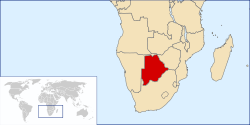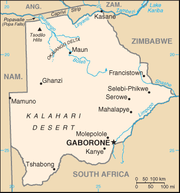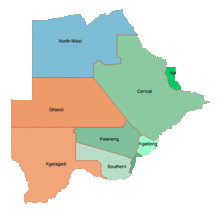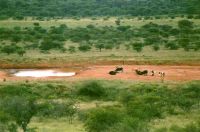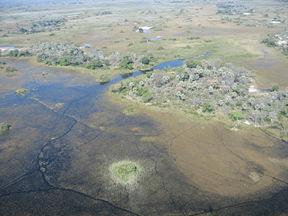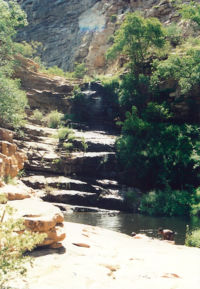Botswana
2008/9 Schools Wikipedia Selection. Related subjects: Africa; African Countries
| Lefatshe la Botswana Republic of Botswana
|
||||||
|---|---|---|---|---|---|---|
|
||||||
| Motto: Pula Rain |
||||||
| Anthem: Fatshe leno la rona Blessed Be This Noble Land |
||||||
|
|
||||||
| Capital (and largest city) |
Gaborone |
|||||
| Official languages | English, Tswana (national) | |||||
| Demonym | Batswana | |||||
| Government | Parliamentary republic | |||||
| - | President | Festus Mogae | ||||
| Independence | from the United Kingdom | |||||
| - | Date | September 30, 1966 | ||||
| Area | ||||||
| - | Total | 581,726 km² ( 41st) 224,606 sq mi |
||||
| - | Water (%) | 2.5 | ||||
| Population | ||||||
| - | 2006 estimate | 1,639,833 ( 147th) | ||||
| - | Density | 3.0/km² ( 220th) 7.8/sq mi |
||||
| GDP ( PPP) | 2007 estimate | |||||
| - | Total | $18.72 billion ( 114th) | ||||
| - | Per capita | $14,700 ( 60th) | ||||
| Gini (1993) | 63 (high) | |||||
| HDI (2007) | ▲ 0.654 (medium) ( 124th) | |||||
| Currency | Pula ( BWP) |
|||||
| Time zone | CAT ( UTC+2) | |||||
| - | Summer ( DST) | not observed ( UTC+2) | ||||
| Internet TLD | .bw | |||||
| Calling code | +267 | |||||
Botswana, officially the Republic of Botswana ( Tswana: Lefatshe la Botswana), is a landlocked nation in Southern Africa. Citizens of Botswana are Batswana (singular: Motswana), regardless of ethnicity. Formerly the British protectorate of Bechuanaland, Botswana adopted its new name after becoming independent within the Commonwealth on September 30, 1966. It is bordered by South Africa to the south and southeast, Namibia to the west, Zambia to the north, and Zimbabwe to the northeast. The economy, closely tied to South Africa's, is dominated by mining (especially diamonds), tourism, and cattle.
Geography and environment
- Summary
Botswana is predominantly flat, tending toward gently rolling tableland. The Kalahari Desert is located in the southwest of the country. The Limpopo River Basin is the major landform of all of southern Africa, including Botswana.
- More detail
At 231,788 mi² (600,370 km²), Botswana is the world's 45th-largest country (after Ukraine). It is comparable in size to Madagascar, and is slightly smaller than the state of Texas in the Southern United States.
Botswana is dominated by the Kalahari Desert, which covers up to 70% of the land surface of the country. The Okavango Delta, the world's largest inland delta, is in the northwest. The Makgadikgadi Pan, a large salt pan lies in the north.
Botswana has diverse areas of wildlife habitat, including the Okavango Delta, the Kalahari Desert, grasslands and savannas, the latter where Blue Wildebeest and many antelopes as well as other mammals and birds are found.
Politics and government
The politics of Botswana takes place in a framework of a presidential representative democratic republic, whereby the President of Botswana is both head of state and head of government, and of a pluriform multi-party system. Executive power is exercised by the government. Legislative power is vested in both the government and the Parliament of Botswana. Since independence the party system has been dominated by the Botswana Democratic Party. The Judiciary is independent of the executive and the legislature.
Defense
At the time of independence Botswana had no armed forces, It was only after attacks from the Rhodesian army that Botswana formed a Botswana Defence Force (BDF) in self-defence in 1977. The president is commander in chief and a defence council is appointed by the president. The BDF now has approximately 12,000 members.
The BDF is a capable and well-disciplined military force. Following positive political changes in South Africa and the region, the BDF's missions have increasingly focused on anti-poaching activities, disaster-preparedness, and foreign peacekeeping. The United States has been the largest single foreign contributor to the development of the BDF, and a large segment of its officer corps has received U.S. training. It is considered an apolitical and professional institution.
Foreign relations
Botswana puts a premium on economic and political integration in Southern Africa. It seeks to make SADC a working vehicle for economic development, and promotes efforts to make the region self-policing in terms of preventative diplomacy, conflict resolution, and good governance. It has welcomed post-apartheid South Africa as a partner in these efforts. Botswana joins the African consensus on most major international matters and is a member of international organisations such as the United Nations, the Commonwealth of Nations and the African Union (AU). Botswana is also a member of the International Criminal Court with a Bilateral Immunity Agreement of protection for the US-military (as covered under Article 98).
Districts and sub-districts
Botswana is divided into nine districts:
|
1. Central |
6. North-East |
|
These districts are subdivided into a total twenty-eight subdistricts.
- Main population centres (in descending order)
Cities
- Gaborone
- Francistown
Towns and villages
|
|
|
|
|
|
Economy
Since independence, Botswana has had one of the fastest growth rates in per capita income in the world. Botswana has transformed itself from one of the poorest countries in the world to a middle-income country with a per capita GDP of $14,700 in 2007. Economic growth averaged over 9% per year from 1966 to 1999. The government has maintained a sound fiscal policy, despite consecutive budget deficits in 2002 and 2003, and a negligible level of foreign debt. It earned the highest sovereign credit rating in Africa and has stockpiled foreign exchange reserves (over $7 billion in 2005/2006) amounting to almost two and a half years of current imports. Botswana's impressive economic record has been built on the foundation of wisely using revenue generated from diamond mining to fuel economic development through prudent fiscal policies and a cautious foreign policy. Debswana, the only diamond mining company operating in Botswana, is 50% owned by the government and generates about half of all government revenues. In 2007, significant quantities of Uranium were discovered, and mining is projected to begin by 2010. Several international mining corporations have prospected in Botswana for diamonds, gold, uranium, copper, and even oil, many coming back with positive results.
However, economic development spending was cut by 10% in 2002-2003 as a result of recurring budget deficits and rising expenditure on healthcare services. Botswana has been hit very hard by the AIDS epidemic; the average life expectancy in Botswana at birth, 1990: 64 years, 2005: 34 years. This is barely half the 59-year average for low-income countries, and Botswana residents, along with those of Swaziland, have the shortest average lifespan in the world. Approximately one in three Batswana has HIV, giving Botswana the second highest HIV infection rate in the world after Swaziland. The government recognizes that HIV/AIDS will affect the economy and is trying to combat the epidemic, including free Antiretroviral drug treatment and a nation-wide Prevention of Mother-to-Child Transmission program. Some of Botswana's budget deficits can be traced to relatively high military expenditures (about 4% of GDP in 2004, according to the CIA World Factbook), which some critics contend is unnecessary given the low likelihood of international conflict (though the Botswana government also makes use of these troops for multilateral operations and assistance efforts).
Trade
Botswana is part of the Southern African Customs Union ( SACU) with South Africa, Lesotho, Swaziland, and Namibia. The World Bank reports that in 2001 (the most recent year for which World Bank data are available), the SACU had a weighted average common external tariff rate of 3.6 percent. According to the U.S. Department of Commerce, "There are very few tariff or non-tariff barriers to trade with Botswana, apart from restrictions on licensing for some business operations, which are reserved for [Botswana] companies." Based on the revised trade factor methodology, Botswana's trade policy score is unchanged. The main export of Botswana is diamonds. Jwaneng, in Botswana, is the world's largest and richest diamond mine thus the demand of diamonds from Botswana is fairly high. The mine was discovered when termites looking for water brought grains of diamond to the surface. If the great demand of diamonds were to go into rapid decline, then the economy of Botswana would suffer greatly as they are highly dependent on this export. The diamond mine in Jwaneng provides many jobs for the unemployed in Botswana as people are needed to physically extract the diamonds, and to build the roads needed for their transport, for example. A source of foreign exchange is also introduced to the economy and it offers a potential basis for industrial development, and thus stimulates improvements within Botswana's infrastructure.
Private sector development and foreign investment
Botswana seeks to further diversify its economy away from minerals, which account for a third of GDP, down from nearly half of GDP in the early 1990s. Foreign investment and management are welcomed in Botswana. Botswana abolished foreign exchange controls in 1999, has a low corporate tax rate (15%), no prohibitions on foreign ownership of companies, and a moderate inflation rate (7.6% November 2004). The Government of Botswana is currently considering additional policies to enhance competitiveness, including a new Foreign Direct Investment Strategy, Competition Policy, Privatisation Master Plan, and National Export Development Strategy.
With its proven record of good economic governance, Botswana was ranked as Africa's least corrupt country by Transparency International in 2004, ahead of many European and Asian countries. The World Economic Forum rates Botswana as one of the two most economically competitive nations in Africa. In 2004 Botswana was once again assigned "A" grade credit ratings by Moody's and Standard & Poor's. This ranks Botswana as by far the best credit risk in Africa and puts it on par with or above many countries in central Europe, East Asia, and Latin America.
U.S. investment in Botswana remains at relatively low levels, but continues to grow. Major U.S. corporations, such as H.J. Heinz and AON Corporation, are present through direct investments, while others, such as Kentucky Fried Chicken and Remax, are present via franchise. The sovereign credit ratings by Moody's and Standard & Poor's clearly indicate that, despite continued challenges such as small market size, landlocked location, and cumbersome bureaucratic processes, Botswana remains one of the best investment opportunities in the developing world. Botswana has a 90-member American Business Council that accepts membership from American-affiliated companies.
Due to its history and geography, Botswana has long had deep ties to the economy of South Africa. The Southern Africa Customs Union (SACU), comprising Botswana, Lesotho, Swaziland, and South Africa, dates from 1910, and is the world’s oldest customs union. Namibia joined in 1990. Under this arrangement, South Africa has collected levies from customs, sales, and excise duties for all five members, sharing out proceeds based on each country's portion of imports. The exact formula for sharing revenues and the decision-making authority over duties — held exclusively by the Government of South Africa — became increasingly controversial, and the members renegotiated the arrangement in 2001. The new structure has now been formally ratified and a SACU Secretariat has been established in Windhoek, Namibia. Following South Africa's accession to the World Trade Organization (WTO), Botswana also joined; many of the SACU duties are thus declining, making products from outside the area more competitive in Botswana. Currently the SACU countries and the U.S. are negotiating a free trade agreement. Botswana is currently also negotiating a free trade agreement with Mercosur and an Economic Partnership Agreement with the European Union as part of SADC.
Botswana's currency, the pula, is fully convertible and is valued against a basket of currencies heavily weighted toward the South African Rand. Profits and direct investment can be repatriated without restriction from Botswana. The Botswana Government eliminated all exchange controls in 1999. The Central Bank devalued the Pula by 7.5% in February 2004 in a bid to maintain export competitiveness against the real appreciation of the Pula. There was a further 12% devalution in May 2005 and the policy of a "crawling peg" was adopted.
Most (70%) of Botswana's electricity is imported from South Africa's Eskom. 80% of domestic production is concentrated in one plant, Morupule Power Station near Palapye.
Gaborone is host to the headquarters of the fourteen-nation Southern African Development Community (SADC), a successor to the Southern African Development Coordination Conference (SADCC, established in 1980), which focused its efforts on freeing regional economic development from dependence on apartheid South Africa. SADC embraced the newly democratic South Africa as a member in 1994 and has a broad mandate to encourage growth, development, and economic integration in Southern Africa. SADC's Trade Protocol, which was launched on September 1, 2000, calls for the elimination of all tariff and non-tariff barriers to trade by 2008 among the 11 signatory countries. If successful, it will give Botswana companies free access to the far larger regional market. SADC's failure to distance itself from the Mugabe government in Zimbabwe has diminished the number of opportunities for cooperation between the U.S. and SADC.
Botswana is in the process or formulating an Action Programme on the Elimination of Child Labour, which is expected to be adopted in the period 2006-2007.
Tourism
Tourism plays a large role in the Botswana economy. A number of national parks and game reserves, with their abundant wildlife and wetlands, are a top draw for tourists. The wildlife, including lions, brown hyenas, cheetahs, leopards, wild dogs and antelope, were described in great detail in the best-selling book "Cry of the Kalahari" by Mark and Delia Owens.
The main safari destinations for tourism are Moremi Game Reserve in the Okavango Delta, and Chobe National Park. Botswana is also participating in community based natural resource management projects by trying to involve villagers in tourism. One example is the village of Khwai and its Khwai Development Trust.
Botswana was the location for the 1980 movie The Gods Must Be Crazy.The country is also the location for the fictional The No. 1 Ladies' Detective Agency stories.
Sports
The most popular sport in Botswana is football, while other popular sports include softball, volleyball and athletics. Botswana is an associate member of International Cricket Council.


